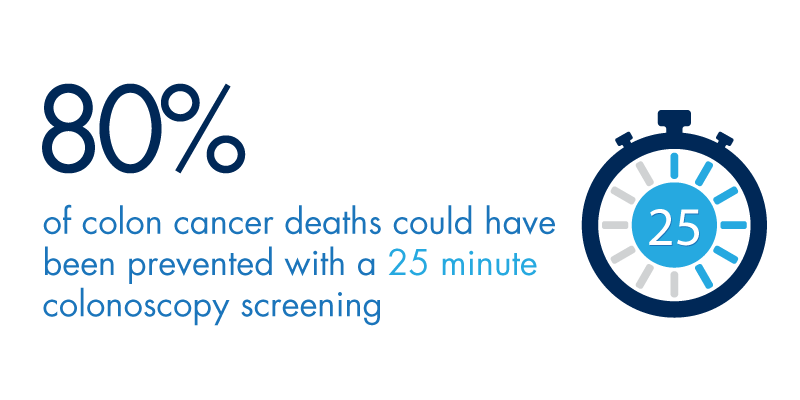
Colonoscopy is an extremely safe and effective procedure for viewing the full lining of the colon and rectum. The colonoscope is a long, thin, flexible instrument with a camera at the tip for viewing. It is introduced through the rectum and advanced until it reaches the beginning of the colon (about 4 feet). Images from the colonoscope appear on a video monitor with a high degree of detail and magnification providing excellent visualization of the entire colon.
Colonoscopy is performed under “conscious sedation”. This means the patient is given medicine through an IV so they are not awake, not aware, not in pain, and have no memory of the experience. Over 99% of patients relate a positive experience with the procedure. Typically, the exam will take less than 20 minutes, and patients are home usually within 1-2 hours. Patients may experience bloating and/or diarrhea for 1-2 days after the procedure.
On the day prior to the colonoscopy the colon needs to be prepared for the procedure. Patients may consume liquids all day. A special bowel prep is given to clean out stool from the colon. The day after colonoscopy patients can resume normal eating, medicines, and activities without any restrictions.
Colonoscopy is the most effective modality in colon cancer prevention. Colonoscopy will often be recommended for patients in the following situations:
Colonoscopy is considered the gold standard for colon testing. Other options include barium enema, sigmoidoscopy, virtual colonography and stool testing. The advantages of colonoscopy over the other modalities include:
There are two types of Colonoscopy:
Diagnostic – performed based on acute symptomsIf you have experienced one or several of the symptoms/diagnosis listed below, you should consult one of our doctors:
Colon cancer is the second most common cancer in the United States with approximately 250,000 new cases each year. One of the most important services we offer is our colon cancer screenings. Through an essentially painless 15 minute exam, we try to help prevent patients from developing colon cancer. By removing colon polyps, which is easy, painless, and almost entirely free of potential complications, colon cancer is often averted in our patients.
Patients are placed in one of two categories, high risk and low risk.
Low Risk – These patients typically have no symptoms or history of colon disease, cancer, or polyps (personal or family). Colonoscopy is performed beginning at 50 years of age.
High Risk – These patients usually have one or more of the characteristics listed below. In this case, colonoscopy is performed more frequently or at a younger age based on the indication or diagnosis.
The Affordable Care Act passed in March 2010 allowed for several preventative services, such as colonoscopies, to be covered at no cost to the patient. However, there are many caveats that prevent patients from taking advantage of this provision. One example is a “grandfather” clause; where insurance companies have two years before offering preventative services at no cost. There are now strict and changing guidelines on which colonoscopies are defined as a preventative service (screening). These guidelines may exclude many patients with gastrointestinal histories from taking advantage of the service at no cost. Patients may be required to pay co-pays and deductibles.
Our practice has created this document to sort through some of the confusion and misinformation out there. Here is what you need to know:
Diagnostic/Therapeutic Colonoscopy
Patient has past and/or present gastrointestinal symptoms, polyps, or gastrointestinal disease.
Surveillance/High Risk Screening Colonoscopy
Patient is asymptomatic (no gastrointestinal symptoms either past or present), has a personal history of gastrointestinal disease, colon polyps, and/or cancer. Patients in this category are required to undergo colonoscopy surveillance at shortened intervals (e.g. every 2-5 years).
Preventive Colonoscopy Screening
Patient is asymptomatic (no gastrointestinal symptoms either past or present), over the age of 50, has no personal or family history of gastrointestinal disease, colon polyps, and/or cancer. The patient has not undergone a colonoscopy within the last 10 years.
Your primary care physician may refer you for a “screening” colonoscopy; however, you may not qualify for the “screening” category. This is determined in the pre-operative process. Before the procedure, you should know your colonoscopy category. After establishing what type of procedure you are having, you can do some research.
Have you had a colonoscopy procedure at our office?
Find our Follow-Up Colonoscopy Screening Forms here. Please print, complete, and return this form to our office as you schedule your screening appointment.